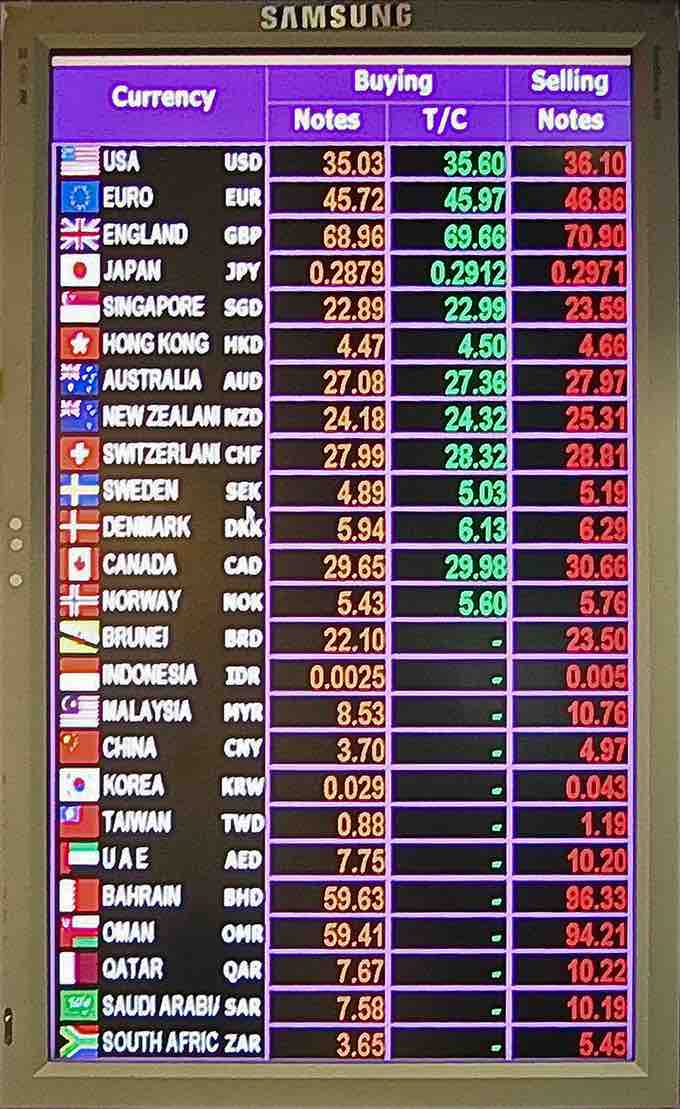Exchange Rates
A foreign currency exchange rate between two currencies is the rate at which one currency will be exchanged for another. It is also regarded as the value of one country's currency in terms of another's. Exchange rates are determined in the foreign exchange market. The "forex" or "FX" market is the largest currency exchange market in the world today, where trading averages around 5.3 trillion US dollars per day (data from April, 2013).
Exchange rates can be quoted in two ways: (1) A direct quote, is to state the number of domestic units of currency per one unit of foreign currency; (2) If an exchange rate is an indirect quote, the exchange rate is stated as the number of foreign units per one unit of domestic currency.
Foreign Exchange for Travelers
People may need to exchange currencies in a number of situations. For example, people intending to travel to another country may buy foreign currency in a bank in their home country, where they may buy foreign currency cash, traveler's checks, or a travel-card. They can only buy foreign cash from a local money changer.
At the destination, travelers can buy local currency at the airport, at their hotel, a local money changer or dealer, through an ATM, or at a bank branch. When they purchase goods in a store and they do not have local currency, they can use a credit card, which will convert to the purchaser's home currency at its prevailing exchange rate. If they have traveler's checks or a travel card in the local currency, no currency exchange is necessary.
If a traveler has any foreign currency left over on his return home, he may want to sell it, which he may do at his local bank or money changer. The exchange rate, as well as fees and charges, can vary significantly on each of these transactions, and the exchange rate can vary from one day to the next.
Fluctuations in Exchange Rates
A currency pair is the quotation of the relative value of a currency unit against the unit of another currency in the foreign exchange market. The quotation EUR/USD 1.25 means that one euro is exchanged for 1.25 US dollars.
Each country, through varying mechanisms, manages the value of its currency. As part of this function, it determines the exchange rate regime that will apply to its currency. For example, the currency may be free-floating, pegged or fixed, or a hybrid.
If a currency is free-floating, its exchange rate is allowed to vary against that of other currencies and is determined by the market forces of supply and demand. This currency is said to have a "floating exchange rate. " Exchange rates for such currencies are likely to change almost constantly as quoted on financial markets, mainly by banks, around the world.
A movable or adjustable peg system is a system of fixed exchange rates, but with a provision for the devaluation of a currency. For example, between 1994 and 2005, the Chinese yuan renminbi (RMB) was pegged to the United States dollar at RMB 8.2768 to $1.00. China was not the only country to do this; from the end of World War II until 1967, Western European countries all maintained fixed exchange rates with the US dollar based on the Bretton Woods system. But that system had to be abandoned due to market pressures and speculations in the 1970s in favor of floating, market-based regimes.
Still, some governments keep their currency within a narrow range. As a result, currencies become over-valued or under-valued, causing trade deficits or surpluses. A market-based exchange rate will change whenever the values of either of the two component currencies change.
A currency will tend to become more valuable whenever demand for it is greater than the available supply. Conversely, it will become less valuable whenever demand is less than available supply. Increased demand for a currency can be due to either an increased transaction demand for money or an increased speculative demand for money.
Transaction Demand vs. Speculative Demand
The transaction demand is highly correlated to a country's level of business activity, gross domestic product (GDP), and employment levels. The more people who are unemployed, the less the public as a whole will spend on goods and services. Central banks typically have little difficulty adjusting the available money supply to accommodate changes in the demand for money due to business transactions.
Speculative demand is much harder for central banks to accommodate, which they influence by adjusting interest rates. A speculator may buy a currency if the return (that is the interest rate) is high enough. In general, the higher a country's interest rates, the greater the demand for its currency.

Exchange Rates
Example of exchange rates display in Thailand.